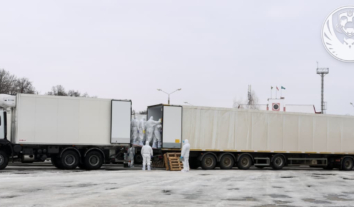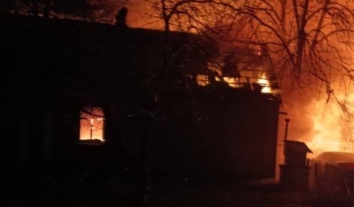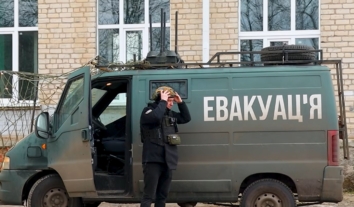De-identified Crimea: Occupying state massively eradicates ethnic celebrations – Amnesty International
Since the annexation of the Crimean Peninsula by Russia, the local de facto authorities have banned many cultural events and have virtually extinguished public protest, thereby violating the rights to free expression, peaceful assembly, and cultural identity. This has affected everything from street protests to traditional commemorative and cultural events held by Crimean Tatars, as well as gatherings to celebrate Ukrainian culture, according to the report by Amnesty International, marking the 10th anniversary of the occupation of the Crimean Peninsula.
 Illegitimate “officers of police” in temporarily occupied Crimea
Illegitimate “officers of police” in temporarily occupied CrimeaThe human rights NGO reported that May 18, 2014, marked the 70th anniversary of the deportation of the entire Crimean Tatar population to remote parts of the USSR. Two days before, the then-de facto “Prime Minister” of Crimea, Serhii Aksenov, announced that all public assemblies in Crimea were to be disallowed until 6 June, to prevent possible “provocations” and any “disruption of the summer holiday season.”
Amnesty International called the ban cynical, intended to prevent the commemoration of 18 May by the Crimean Tatar population, who in the end were allowed to perform a collective prayer in just one remote location, in the presence of a large law enforcement force.
In 2016, no assemblies were authorised, as the de facto “Mayor of Simferopol” issued a blanket ban on all mass public, cultural, entertainment and other events, except those organized by the authorities.
Local de facto authorities’ prior permission (as required by Russian laws) to hold this and other Crimean Tatar commemorations, such as Flag Day on 26 June, have also been repeatedly denied since 2014. The authorities continue to issue spurious justifications for these refusals, such as claiming that extremely high temperatures could negatively affect the health of participants, while allowing other events to take place on the same day.
Moreover, the authorities have threatened those intending to organize or participate in such commemorations with criminal prosecution and administrative detention. The clampdown on cultural celebrations imposed by the de facto authorities also affects the cultural life of other groups on the peninsula.
A 2016 resolution from the de facto “Government of Crimea” cut the number of locations where public events could occur by almost half. Events such as Pride marches have been banned. In addition to the Crimean Tatar community, the de facto authorities have paid particular attention to public displays of Ukrainian culture, politics, and nationality. The public display of Ukrainian state and cultural symbols was restricted prior to 2022, while institutions promoting Ukrainian culture and traditions have been shut down.
On 9 March 2015, the de facto authorities refused permission to hold an event involving the laying of flowers at the monument of Ukraine’s national poet, Taras Shevchenko, as well as the celebration of the 201st anniversary of his
birthday.76 The United Nations Human Rights Monitoring Mission in Ukraine reported that books by contemporary Ukrainian authors have even been removed from the Franko Library located in temporarily occupied Simferopol.
Amnesty International highlighted that the full-scale invasion in February 2022 has dramatically worsened the situation. People in Crimea are subjected to work dismissal, fines, increasingly frequent intrusive and deliberately destructive
house searches, so-called administrative detention, and arbitrary arrest and prosecution for any expression of support for Ukraine or for mere suspicion of disloyalty to the occupying Russian authorities.
The Council of Europe reported that Crimean Tatars, have alleged the presence of state surveillance and scrutiny of cultural events as small as weddings.
Amnesty International concluded, that Russia has had ten years to implement its policies designed to alter the ethnic makeup of and suppress non-Russian identities in Crimea. Through population transfer and coercive policies targeting minorities, it has sought to dilute and remove Ukrainian and Crimean Tatar identity from the peninsula.
Earlier, grass-root initiative Crimean Solidarity reported that Russians have continued their illegal tendency to intimidate and persecute the representatives of the Crimean Tatar people this year. The occupants illegally visit the houses of the Crimean Tatar activists, lawyers, and journalists and force them to read the alleged “warning about the inadmissibility of extremist actions,” and to record the video with it.
The occupiers are threatening the Crimean Tatar activists with administrative and criminal proceedings on political grounds because of the 80th anniversary of the deportation of the Crimean Tatar people, which will be commemorated on May 18. The “warning” was issued to public defender and activist Seit-Osman Karaliiev, lawyers and spouses Lilia Hemedzhi and Rustem Kamilov, human rights defender and lawyer Nazym Sheikhmambetov, as well as human rights defender and journalist Lutfiie Zudiieva.
Since Russia’s military operation to seize the Crimean Peninsula, the occupying country has been unlawfully requiring organisers of peaceful gatherings to obtain permits for their events. Representatives of the “administrations” on the peninsula typically deny permission for actions that could criticise the de facto authorities.
The freedom of peaceful assembly does not require obtaining permission to hold events. According to Ukrainian legislation, which applies to the Autonomous Republic of Crimea, the authorities should be informed about the plans for a peaceful assembly so they can ensure law and order during the event. This is their duty.
As of May 2024, Russia has illegally imprisoned 218 people in occupied Crimea on ethnic, religious, and political grounds, including 133 Crimean Tatars.
Amnesty International called on the international community, inter alia, to take steps to ensure Russia’s full cooperation with all international and regional monitoring mechanisms. This would include granting full and unrestricted access to their representatives to Crimea and other Ukrainian territories under Russian control, and escalating efforts to ensure Russia’s compliance with its obligations under international humanitarian and human rights law.
Moreover, the human rights organisation called on the world community to take steps to ensure all perpetrators are brought to justice through independent, impartial, and fair trials for all crimes under international law, so victims of these crimes can fully realise their rights to truth, justice, and reparations.














